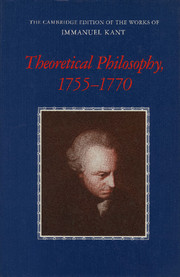Book contents
- Frontmatter
- Contents
- General editors' preface
- Preface
- Guide to abbreviations
- General introduction
- Introductions to the translations
- Résumés of the works
- A NEW ELUCIDATION OF THE FIRST PRINCIPLES OF METAPHYSICAL COGNITION (1755)
- THE EMPLOYMENT IN NATURAL PHILOSOPHY OF METAPHYSICS COMBINED WITH GEOMETRY, OF WHICH SAMPLE I CONTAINS THE PHYSICAL MONADOLOGY (1756)
- AN ATTEMPT AT SOME REFLECTIONS ON OPTIMISM (1759)
- THE FALSE SUBTLETY OF THE FOUR SYLLOGISTIC FIGURES (1762)
- THE ONLY POSSIBLE ARGUMENT IN SUPPORT OF A DEMONSTRATION OF THE EXISTENCE OF GOD (1763)
- ATTEMPT TO INTRODUCE THE CONCEPT OF NEGATIVE MAGNITUDES INTO PHILOSOPHY (1763)
- INQUIRY CONCERNING THE DISTINCTNESS OF THE PRINCIPLES OF NATURAL THEOLOGY AND MORALITY (1764)
- M. IMMANUEL KANT'S ANNOUNCEMENT OF THE PROGRAMME OF HIS LECTURES FOR THE WINTER SEMESTER 1765 — 1766 (1765)
- DREAMS OF A SPIRIT-SEER ELUCIDATED BY DREAMS OF METAPHYSICS (1766)
- Preamble, which promises very little for the execution of the project
- The first part, which is dogmatic
- The second part, which is historical
- First chapter A story, the truth of which is recommended to the reader's own free examination
- Second chapter Ecstatic journey of an enthusiast through the spirit-world
- Third chapter Practical conclusion drawn from the treatise as a whole
- CONCERNING THE ULTIMATE GROUND OF THE DIFFERENTIATION OF DIRECTIONS IN SPACE (1768)
- ON THE FORM AND PRINCIPLES OF THE SENSIBLE AND THE INTELLIGIBLE WORLD [INAUGURAL DISSERTATION] (1770)
- Factual notes
- Bibliographies of editions and translations
- Glossary
- Biographical-bibliographical sketches of persons mentioned by Kant
- Index
Third chapter - Practical conclusion drawn from the treatise as a whole
Published online by Cambridge University Press: 18 December 2014
- Frontmatter
- Contents
- General editors' preface
- Preface
- Guide to abbreviations
- General introduction
- Introductions to the translations
- Résumés of the works
- A NEW ELUCIDATION OF THE FIRST PRINCIPLES OF METAPHYSICAL COGNITION (1755)
- THE EMPLOYMENT IN NATURAL PHILOSOPHY OF METAPHYSICS COMBINED WITH GEOMETRY, OF WHICH SAMPLE I CONTAINS THE PHYSICAL MONADOLOGY (1756)
- AN ATTEMPT AT SOME REFLECTIONS ON OPTIMISM (1759)
- THE FALSE SUBTLETY OF THE FOUR SYLLOGISTIC FIGURES (1762)
- THE ONLY POSSIBLE ARGUMENT IN SUPPORT OF A DEMONSTRATION OF THE EXISTENCE OF GOD (1763)
- ATTEMPT TO INTRODUCE THE CONCEPT OF NEGATIVE MAGNITUDES INTO PHILOSOPHY (1763)
- INQUIRY CONCERNING THE DISTINCTNESS OF THE PRINCIPLES OF NATURAL THEOLOGY AND MORALITY (1764)
- M. IMMANUEL KANT'S ANNOUNCEMENT OF THE PROGRAMME OF HIS LECTURES FOR THE WINTER SEMESTER 1765 — 1766 (1765)
- DREAMS OF A SPIRIT-SEER ELUCIDATED BY DREAMS OF METAPHYSICS (1766)
- Preamble, which promises very little for the execution of the project
- The first part, which is dogmatic
- The second part, which is historical
- First chapter A story, the truth of which is recommended to the reader's own free examination
- Second chapter Ecstatic journey of an enthusiast through the spirit-world
- Third chapter Practical conclusion drawn from the treatise as a whole
- CONCERNING THE ULTIMATE GROUND OF THE DIFFERENTIATION OF DIRECTIONS IN SPACE (1768)
- ON THE FORM AND PRINCIPLES OF THE SENSIBLE AND THE INTELLIGIBLE WORLD [INAUGURAL DISSERTATION] (1770)
- Factual notes
- Bibliographies of editions and translations
- Glossary
- Biographical-bibliographical sketches of persons mentioned by Kant
- Index
Summary
To pursue every curiosity and to allow no limits to the thirst for knowledge apart from that of impotence – such zealousness does not ill-become learning. But, from among the innumerable tasks which spontaneously offer themselves, to choose that task, the solution of which is of importance to man – such choice is the merit of wisdom. When science has run its course, it naturally arrives at the point of modest mistrust and says, dissatisfied with itself: How many are the things which I do not understand! But reason, matured by experience into wisdom, serenely speaks through the mouth of Socrates, who, surrounded by the wares of a market-fair, remarked: How many are the things of which I have no need. In this way, two very dissimilar aspirations eventually flow together, even though to begin with they started out in very different directions, the one being vain and dissatisfied, the other composed and contented. For, in order to choose rationally one must already have knowledge of what is superfluous, indeed, impossible. But, eventually science arrives at the determination of the limits imposed upon it by the nature of human reason. All the fathomless projects, however, which may not in themselves, perhaps, be unworthy, except that they lie outside the sphere of man, fly to the limbo of vanity. It is then that even metaphysics becomes that which it is far from being at the moment, and which one would least expect it to be, namely, the companion of wisdom. For, as long as the opinion survives that it is possible to attain to an understanding of such remote things, wise simplicity will call in vain that such great aspirations are superfluous. The feeling of satisfaction which accompanies the extension of knowledge will very easily assume the appearance of dutifulness and convert that deliberate and reflective contentment into the foolish simplicity, which wishes to oppose the ennoblement of our nature.
- Type
- Chapter
- Information
- Theoretical Philosophy, 1755–1770 , pp. 355 - 360Publisher: Cambridge University PressPrint publication year: 1992

